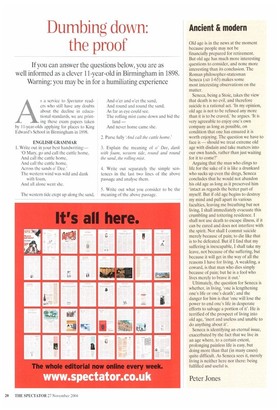Ancient & modern
Old age is in the news at the moment because people may not be financially prepared for retirement. But old age has much more interesting questions to consider, and none more interesting than its conclusion. The Roman philosopher-statesman Seneca (AD 1-65) makes some most interesting observations on the matter.
Seneca, being a Stoic, takes the view that death is no evil, and therefore suicide is a rational act. 'In my opinion, old age is not to be refused any more than it is to be craved,' he argues. 'It is very agreeable to enjoy one's own company as long as possible, on condition that one has ensured it is worth enjoying. The question we have to face is — should we treat extreme old age with disdain and take matters into our own hands, rather than just waiting for it to come?'
Arguing that the man who clings to life for the sake of it is like a drunkard who sucks up even the dregs, Seneca concludes that he would not abandon his old age as long as it preserved him 'intact as regards the better part of myself. But if old age begins to destroy my mind and pull apart its various faculties, leaving me breathing but not living, I shall immediately evacuate this crumbling and tottering residence. I shall not use death to escape illness, if it can be cured and does not interfere with the spirit. Nor shall I commit suicide merely because of pain; to die like that is to be defeated. But if I find that my suffering is inescapable, I shall take my leave, not because of the suffering, but because it will get in the way of all the reasons I have for living. A weakling, a coward, is that man who dies simply because of pain; but he is a fool who lives merely to brave it out.'
Ultimately, the question for Seneca is whether, in living, 'one is lengthening one's life or one's death'; and the danger for him is that 'one will lose the power to end one's life in desperate efforts to salvage a portion of it'. He is terrified of the prospect of living into old age, 'inert and useless and unable to do anything about it'.
Seneca is identifying an eternal issue, exacerbated by the fact that we live in an age where, to a certain extent, prolonging painless life is easy, but doing more than that (in many cases) quite difficult. As Seneca sees it, merely living is neither here nor there: being fulfilled and useful is.


















































































 Previous page
Previous page